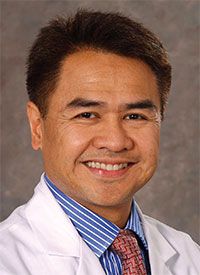UC Davis Cancer Center Promotes Primo Lara to Director
The National Cancer Institute-designated UC Davis Comprehensive Cancer Center has chosen Primo Nery Lara, Jr., MD, to serve as director. His position will include leading a team of over 300 scientists in their annual research, with an estimated annual research funding of $90 million. The clinical enterprise also serves over 10,000 regional patients annually.
Primo Nery Lara, Jr., MD

Primo Nery Lara, Jr., MD
The National Cancer Institute-designated UC Davis Comprehensive Cancer Center has chosen Primo Nery Lara, Jr., MD, to serve as director. His position will include leading a team of over 300 scientists in their annual research, with an estimated annual research funding of $90 million. The clinical enterprise also serves over 10,000 regional patients annually.
Lara will replace Ralph de Vere White, who retired in 2016 from the director position. Since White’s retirement, Lara has served as acting director. In his new position, Lara will also serve as executive associate dean for cancer programs, and will hold the Codman-Radke Chair in Cancer Research position.
Lara, known to many as “Lucky” Lara, joined the team at UC Davis as a fellow in hematology-oncology while specializing in lung, prostate, and bladder cancers. He joined the faculty in 1999.
His primary research interests have focused on developmental therapeutics in cancer clinical trials, particularly for genitourinary and thoracic cancers. He has also chaired and co-chaired a number of clinical trials, authoring and contributing to over 200 peer-reviewed papers, including his notable work on novel or emerging anti-neoplastic strategies.
In the past at UC Davis, Lara had served as the center’s associate professor for translational research and as co-leader of the Cancer Therapeutics Program.
Lara’s leadership achievements include serving as the deputy chair of SWOG, principal investigator for the NCI-funded K12 Paul Calabresi Clinical Oncology Training Grant, chair to the American Society of Clinical Oncology’s Continuing Medical Education Subcommittee from 2012 to 2013, and Education Committee Chair for the International Association for the Study of Lung Cancer from 2011 to 2013.
Lara’s responsibilities in his new role will include meeting strategic planning goals and aligning those with the university’s goals. He also plans to expand the clinical program outside of the region.
“We have a tremendous opportunity to leverage the unique scientific expertise in the school, laboratories, and academic departments throughout UC Davis. Our job moving forward is to make sure that our collaborations results in transformative cancer research and care for each of our patients,” Lara said in a statement.
Lara is committed to meeting several key priorities during his time as director. These include developing approaches to comparative oncology in which medical teams can test novel therapies or biomarkers in canines with cancer in order to transition these to human trials quickly; building new tools for diagnosing, tracking, and treating cancer; and integrating imaging and therapy into a single platform for scientists to more effectively target cancer cells.